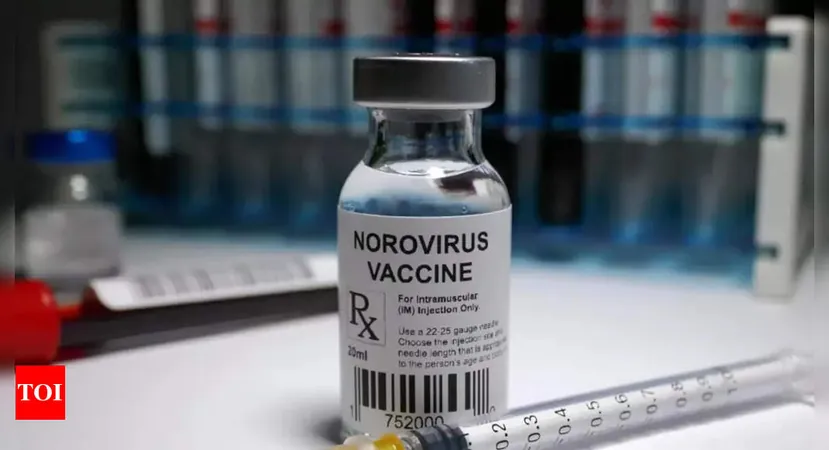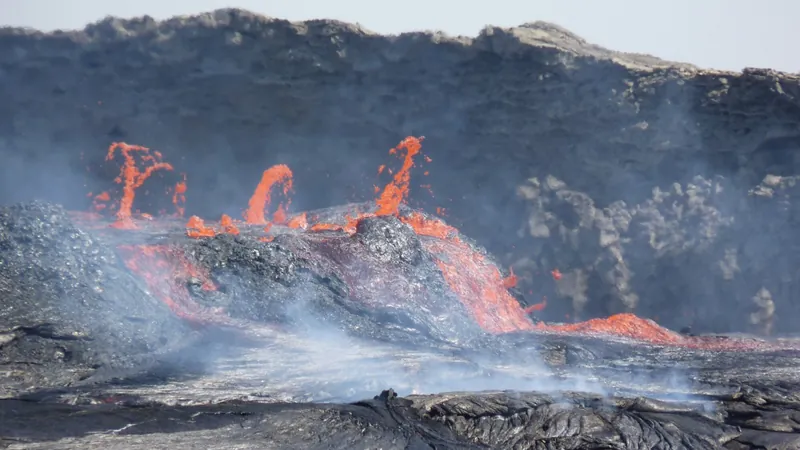
Say Goodbye to Stomach Flu: Moderna's Promising Norovirus Vaccine on the Horizon!
2025-01-25
Author: Wei
Norovirus, the notorious stomach bug that has consistently plagued millions, is experiencing a worrying resurgence across the U.S. and Canada, with a staggering increase in reported cases this winter. With Moderna at the forefront of the battle against this viral threat, the development of a groundbreaking mRNA-based vaccine might finally provide the solution we've all been waiting for, potentially leading to the first approved Norovirus vaccine by 2026!
According to recent statistics from the Centers for Disease Control and Prevention (CDC), Norovirus tests are returning positive results at alarming rates. This January, the positivity rate has doubled compared to the same time last year. As of December 11, there was a reported 36% increase in Norovirus outbreaks.
Meanwhile, Canada is facing a similar situation. Preliminary data from the Public Health Agency of Canada (PHAC) indicates that Norovirus infections are climbing above the five-year average. A cluster of 190 cases was recently reported at the University of Guelph, pointing to the urgent need for effective preventive measures.
Currently, there is no vaccine available for Norovirus, which complicates the fight against it. The virus can manifest in various strains, similar to influenza, making immunization a challenging task. However, Moderna has taken significant strides towards tackling this challenge with their innovative mRNA vaccine candidate known as mRNA-1403. This vaccine aims to generate immunity against multiple Norovirus strains by prompting the body’s cells to produce virus-like particles. These particles provoke an immune response without actual infection.
Stéphane Bancel, CEO of Moderna, acknowledged the public health threat posed by Norovirus, highlighting its potential to cause severe symptoms and hospitalizations each year.
The promising mRNA-1403 is currently in Phase 3 clinical trials, dubbed the Nova 301 Trial, which will assess the vaccine's safety, effectiveness, and immune response in adults. This large-scale study plans to recruit around 25,000 participants across the United States, Canada, Japan, and the United Kingdom. Should the results confirm its safety and effectiveness, Moderna intends to file for regulatory approval with U.S. health authorities in 2026.
Doran Fink, head of Moderna's gastrointestinal and bacterial pathogen research, noted that enrollment for the trial is ahead of schedule, although they need to observe a sufficient number of Norovirus cases to accurately analyze the vaccine's effectiveness. The heightened interest in participation may correlate with the recent surge in Norovirus cases.
But Moderna isn’t alone in this endeavor. Other pharmaceutical firms, such as Vaxtart, are also investing in Norovirus vaccine research. Vaxtart is currently working on an oral vaccine that is in the early stages of clinical trials, reinforcing the industry’s commitment to combatting this widespread pathogen.
But what exactly is Norovirus? Often referred to as the "winter vomiting disease," Norovirus is the leading cause of gastroenteritis globally. First identified during an outbreak in Norwalk, Ohio, in 1968, this virus is highly contagious, spreading through contaminated food, water, surfaces, and even through the air from vomit particles.
Symptoms typically include severe diarrhea, vomiting, and abdominal cramps, manifesting 12 to 48 hours post-exposure. Recovery usually occurs within a few days; however, it’s essential to note that hydration is crucial, particularly for vulnerable populations such as young children and the elderly.
Prevention is currently the best measure against Norovirus, as there is no approved vaccine or antiviral treatment. Proper hand hygiene and disinfecting surfaces are vital to reduce transmission. Traditional alcohol-based sanitizers are ineffective against Norovirus, emphasizing the need for rigorous handwashing.
On a global scale, Norovirus results in approximately 685 million cases annually, leading to around 200,000 deaths, particularly among children in developing nations. It thrives during colder months and is frequently seen in communities with close living quarters.
As we await the outcome of Moderna's clinical trials, there's renewed hope that the days of being struck down by Norovirus could soon be over. Stay tuned for updates—this could be a game changer in public health!



 Brasil (PT)
Brasil (PT)
 Canada (EN)
Canada (EN)
 Chile (ES)
Chile (ES)
 Česko (CS)
Česko (CS)
 대한민국 (KO)
대한민국 (KO)
 España (ES)
España (ES)
 France (FR)
France (FR)
 Hong Kong (EN)
Hong Kong (EN)
 Italia (IT)
Italia (IT)
 日本 (JA)
日本 (JA)
 Magyarország (HU)
Magyarország (HU)
 Norge (NO)
Norge (NO)
 Polska (PL)
Polska (PL)
 Schweiz (DE)
Schweiz (DE)
 Singapore (EN)
Singapore (EN)
 Sverige (SV)
Sverige (SV)
 Suomi (FI)
Suomi (FI)
 Türkiye (TR)
Türkiye (TR)
 الإمارات العربية المتحدة (AR)
الإمارات العربية المتحدة (AR)